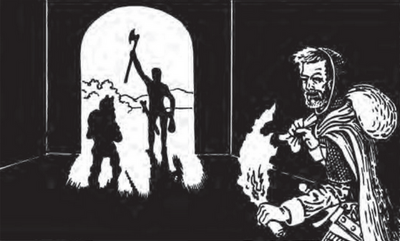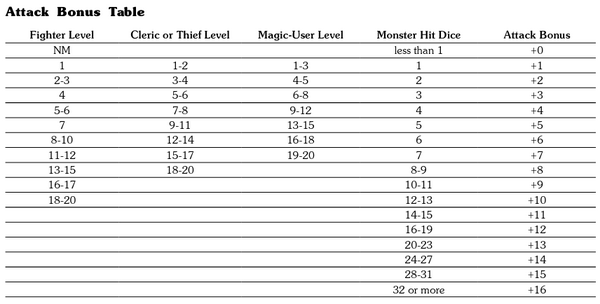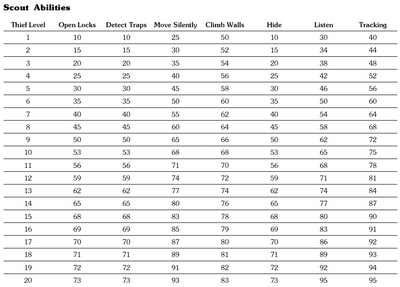Difference between revisions of "Scout"
From The Pedantic March Wiki
WolandNW3T (talk | contribs) |
WolandNW3T (talk | contribs) |
||
| (One intermediate revision by the same user not shown) | |||
| Line 12: | Line 12: | ||
===Description=== | ===Description=== | ||
Scouts specialize in stealth operations in the wilderness. They are similar to Rangers in some ways, having similar functions and abilities. | |||
===Weapons and Armor=== | ===Weapons and Armor=== | ||
* | * Small Melee Weapons, [[Shortbow]], [[Longbow]] | ||
* Leather Armor | * Leather Armor | ||
===Features=== | ===Features=== | ||
* | * Scouts are always expert bowmen. When using any regular bow (shortbow or longbow, but not crossbow), a Scout adds +2 to his or her Attack Bonus. At 5th level, a Scout may fire three arrows every two rounds (a 3/2 rate of fire). This means one attack on every odd round, two on every even round, with the second attack coming at the end of the round. At 9th level, the Scout may fire two arrows every round, with the second attack coming at the end of the round. | ||
* | *Scouts prefer to stay out of direct combat, and therefore practice only with small weapons as they are lighter and easier to carry. They specialize in dual wielding, however prefer to utilize their off-handed weapon as a defensive item, similar to a buckler shield. This must be declared at the start of the round, and in this case no special penalty is applied to the primary weapon, and the off-handed weapon adds an additional +1 to the wielder's AC value against a single melee attacker per round. If the weapon has a magical weapon bonus, it may be applied, but only the base bonus for those weapons with multiple values. If chosen, Scouts may attack with both weapons. In this case, they may attack with their primary weapon with a -2 penalty and their secondary with a -5 penalty to hit. Subtract from this penalty the character's Dexterity bonus, with a minimum penalty of +0 (so a character with 18 Dexterity does not get a +1 bonus to hit this way). | ||
* If a scout is operating alone or greater then 30' away from a party (or in a party composed entirely of scouts), he or she surprises foes on a 1-3 on 1d6. | |||
* Scouts can Move Silently, Hide, Listen, Open Locks, Detect Traps, Climb Walls, and Track using the table below. | |||
* When tracking, the Scout must roll once per hour traveled or lose the trail. | |||
* Scouts are able to detect traps, but unlike Thieves they have no special ability to remove them. | |||
* Scouts cannot pick pockets, as stealing is neither their specialty nor purpose. They usually avoid doing anything that might allow or encourage someone to track them. Unlike a Thief, a scout gains no bonuses for back stabbing, though normal bonuses for attacking from behind or with surprise are applied. | |||
* [[Open Locks]] | * [[Open Locks]] | ||
* [[ | |||
* [[Detect Traps]] | |||
* [[Move Silently]] | * [[Move Silently]] | ||
* [[Hide]] | * [[Hide]] | ||
* [[Climb Walls]] | * [[Climb Walls]] | ||
* [[Listen]] | * [[Listen]] | ||
* [[Tracking]] | |||
[[File:ScoutAbilitiesChart.png|400px]] | [[File:ScoutAbilitiesChart.png|400px]] | ||
===Restrictions=== | ===Restrictions=== | ||
* Must have [[Dexterity]] and [[ | * Must have [[Dexterity]] and [[Wisdom]] scores of 11 or higher and a [[Strength]] of 9 or higher | ||
* Cannot use shields or metal armor without ruining thieving skills | * Cannot use shields or metal armor without ruining thieving skills | ||
* Race: [[Human]] | |||
* Race: [[Human]], [[Elf]], [[Halfling]] | |||
[[Category:Class]] | [[Category:Class]] | ||
Latest revision as of 02:34, 10 May 2022
Scout
Progression
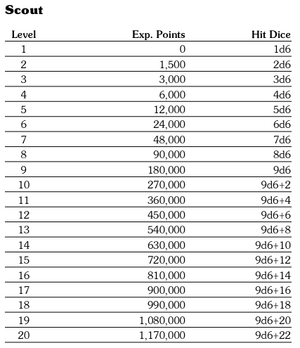
|
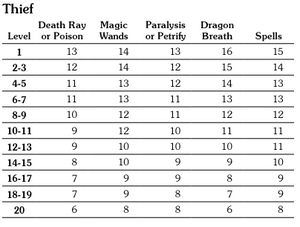
|
|---|
Description
Scouts specialize in stealth operations in the wilderness. They are similar to Rangers in some ways, having similar functions and abilities.
Weapons and Armor
Features
- Scouts are always expert bowmen. When using any regular bow (shortbow or longbow, but not crossbow), a Scout adds +2 to his or her Attack Bonus. At 5th level, a Scout may fire three arrows every two rounds (a 3/2 rate of fire). This means one attack on every odd round, two on every even round, with the second attack coming at the end of the round. At 9th level, the Scout may fire two arrows every round, with the second attack coming at the end of the round.
- Scouts prefer to stay out of direct combat, and therefore practice only with small weapons as they are lighter and easier to carry. They specialize in dual wielding, however prefer to utilize their off-handed weapon as a defensive item, similar to a buckler shield. This must be declared at the start of the round, and in this case no special penalty is applied to the primary weapon, and the off-handed weapon adds an additional +1 to the wielder's AC value against a single melee attacker per round. If the weapon has a magical weapon bonus, it may be applied, but only the base bonus for those weapons with multiple values. If chosen, Scouts may attack with both weapons. In this case, they may attack with their primary weapon with a -2 penalty and their secondary with a -5 penalty to hit. Subtract from this penalty the character's Dexterity bonus, with a minimum penalty of +0 (so a character with 18 Dexterity does not get a +1 bonus to hit this way).
- If a scout is operating alone or greater then 30' away from a party (or in a party composed entirely of scouts), he or she surprises foes on a 1-3 on 1d6.
- Scouts can Move Silently, Hide, Listen, Open Locks, Detect Traps, Climb Walls, and Track using the table below.
- When tracking, the Scout must roll once per hour traveled or lose the trail.
- Scouts are able to detect traps, but unlike Thieves they have no special ability to remove them.
- Scouts cannot pick pockets, as stealing is neither their specialty nor purpose. They usually avoid doing anything that might allow or encourage someone to track them. Unlike a Thief, a scout gains no bonuses for back stabbing, though normal bonuses for attacking from behind or with surprise are applied.
Restrictions
- Cannot use shields or metal armor without ruining thieving skills
